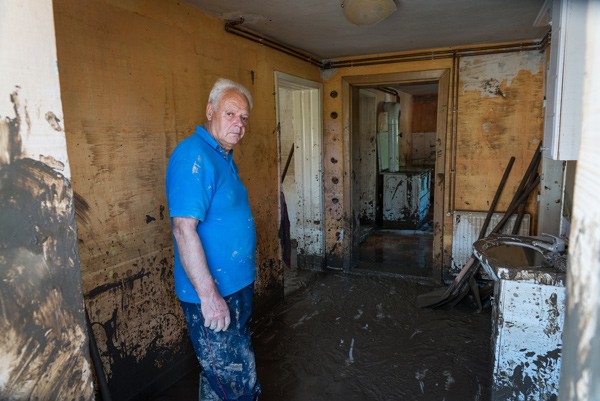
Aug. 2014—The year 2014 will always be remembered in Bosnia and Herzegovina (BiH): It was the year when deadly floods and landslides destroyed everything in their path. Houses, schools, hospitals, businesses, farms and crops were devastated. Damages are in the billions of dollars. Recovery will be long and hard.
USAID will be remembered by some that year as the first international donor to step forward with emergency aid in the initial hours and days after the floods on May 15 that followed unprecedented rains, triggering landslides and unearthing mines from the 1992-1995 war. Assistance through USAID’s Flood Recovery Initiative to help BiH citizens rebuild their lives and livelihoods has since topped $15 million.
In the first 24 hours of the emergency declaration, USAID provided $100,000 for the purchase of 26 rescue boats to help the Red Cross evacuate families in the most-affected areas. In those first crucial hours, certified skippers from local rafting clubs, who are beneficiaries of USAID projects, rescued citizens stranded on the upper floors and rooftops of their homes.
In Doboj, Maglaj and Samac, the situation was especially grave. Entire villages were under water, which, in some places, had already reached the second floor of the buildings and was surging wildly and constantly.
“I have a lot of experience with water, but I have never seen water surging so fast,” said Aleksandar Pastir, rescuer and co-owner of the Kanjon Rafting Club. Meter-high waves tossed around a newsstand, a car and, at one point, a petrol station kiosk as if they were children’s toys, Pastir said.
Later reports would describe the total destruction of roads, bridges, businesses and farms, and bloated, rotting livestock carcasses littering the roads and shopping centers. Mud filled up basements and first floors. Twenty-five people perished.
As waters receded that first week, USAID and Embassy Sarajevo staff drove to Svrake village to deliver food and clothing to families who had lost their homes in mudslides caused by the heavy rains.
Izet Korjenic, 47, and his family had gathered to celebrate a neighbor’s birthday in Svrake on May 15, when they heard an explosion. “I was standing in front of the house and felt something touching my leg. The ground under my feet was deforming, as if it was boiling. The house skewed, the ground started to shake, and we just ran,” said Korjenic.
Over the course of several minutes, the destinies of Korjenic, his friends and neighbors dramatically changed. Twenty-five families lost their homes in that one landslide. There have been more than 2,000 landslides in BiH since that day.
In the immediate aftermath of the disaster, USAID provided more than $2.5 million in humanitarian assistance. During that time, USAID staff and volunteers from local partner KULT (Institute for Youth Development) bought shovels and rubber boots, and organized a convoy of buses and cars to Maglaj. They helped families clean their homes and unbury the few belongings they had left from what had been water four meters deep, but was by then a half-meter of soupy sludge.
Thousands of people like Korjenic and the families in Maglaj will have to start their lives from scratch. Unofficial estimates are that some 85,000 people were evacuated from 82 municipalities in BiH, where around 80,000 people lost their homes, some of them for the second time. In the 1992-95 war, 2 million BiH citizens became refugees.
Recognizing the catastrophic consequences of the floods on the people of BiH, USAID allocated additional funds toward reconstruction efforts. In June, USAID committed $10 million to help rebuild the livelihoods of thousands of families affected by the floods and to expand ongoing economic development projects. Expanded projects include Fostering Interventions for Rapid Market Advancement (FIRMA) and Fostering Agricultural Markets Activity (FARMA), which are funded by USAID and the Swedish International Development Cooperation Agency and which also help to finance the public infrastructure rehabilitation efforts of implementing partner Catholic Relief Services.
USAID also provided funds in June to Mercy Corps and Save the Children to provide small cash grants to 5,000 micro-businesses and small farmers in flood-affected villages, and deliver water sanitation and personal protection kits to over 16,000 people in remote villages.
“Friends help friends in need. The people of BiH are survivors,” said David Barth, USAID’s mission director in BiH. “They will get through this. But they do not stand alone. USAID stands hand-in-hand with them to help them recover and rebuild their homes and businesses, their communities, their lives.”
LINKS







Comment
Make a general inquiry or suggest an improvement.